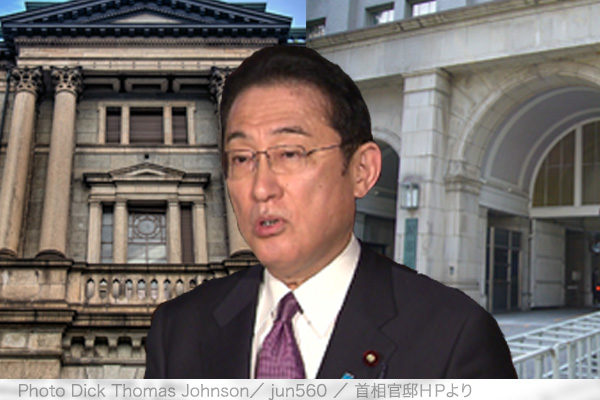Energy prices have been spiking with an economic recovery from the novel coronavirus recession and economic sanctions on oil-producing Russia over its invasion of Ukraine. While the world has entered an inflationary phase, only Japan is in a different situation. Prices are falling along with income in Japan, indicating a serious deflationary recession. Nevertheless, Prime Minister Fumio Kishida has been led by Ministry of Finance (MOF) officials’ balanced budget policy to nominate an anti-monetary easing economist as a member of the Bank of Japan (BOJ) Policy Board.
Enormous MOF influence
Deflation refers to a continuous decline in prices. The globally common measure of inflation is the core consumer price index, which excludes volatile fresh food prices sensitive to weather changes and unstable energy prices susceptible to international situation changes and reflects economic laws based on the supply-demand relationship. Japan’s core CPI growth has remained 0% or lower since August 2020. Japan has stayed in a chronic deflation since the second half of the 1990s.
Deflation causes the national economy to contract. The currency of a country with a declining economy comes under speculative selling. The Japanese yen does so now. As the yen’s depreciation is combined with lower prices and income and with the shrinking economic size, Japanese human resources, technologies, companies and even lands are bought up at very low prices. China that has been consistently increasing its money power could acquire Japan without firing a shot.
The MOF has enormous influence on the Japanese administrations. The second Shinzo Abe administration inaugurated in December 2012 came up with the so-called Abenomics policy to break away from deflation by combining unusual monetary easing with flexible fiscal spending. But it was forced to raise the consumption tax and adopt an austere fiscal policy. Prime Minister Kishida, who heads the Kochikai faction put under the strong MOF influence from the beginning, did not discuss deflation in his policy addresses to the National Diet in December and in January.
Concern about BOJ reshuffle
The BOJ has continued monetary easing up to now. But it has traditionally believed that monetary policies cannot push up prices and that the central bank’s major role is the stabilization of private banks’ management. At the strong request from the then Abe administration, the BOJ in January 2014 promised to promote monetary easing under the target of raising the year-to-year CPI growth to 2%. As the target has been left unrealized, the traditional BOJ belief is gaining momentum in and around the central bank.
Two BOJ Policy Board members who were appointed under the Abe administration are set to leave in July on the expiration of their terms. One of them is Goshi Kataoka, known for his proactive support for monetary easing. The Kishida administration has nominated Okasan Securities Group Inc. economist Hajime Takata as successor to Kataoka. Takata, who hailed from Mizuho Bank, has called for modifying the price hike target of 2%, noting that monetary easing squeezes earnings at banks. His thought meets the MOF hope to stabilize the government bond market through an austere fiscal policy that brings about deflation.
The term for BOJ Governor Haruhiko Kuroda will expire in spring next year. Who will be nominated as new BOJ governor by Prime Minister Kishida? If a person who gives care to both the BOJ belief and the balanced budget policy is nominated, a hope for Japan’s revitalization may be dashed, with the country and its people sinking into a deflationary quagmire. The National Diet should be alert.
Hideo Tamura is a Planning Committee member at the Japan Institute for National Fundamentals and a columnist for the Sankei Shimbun newspaper.


